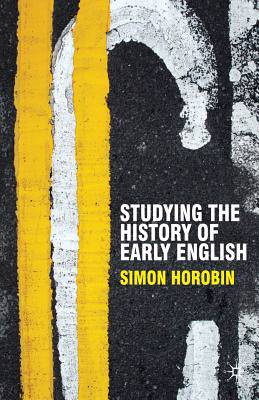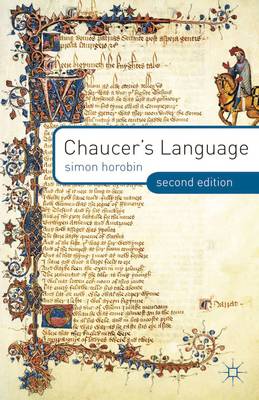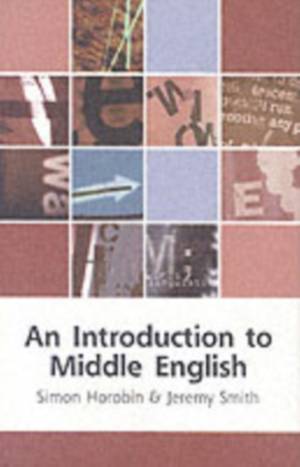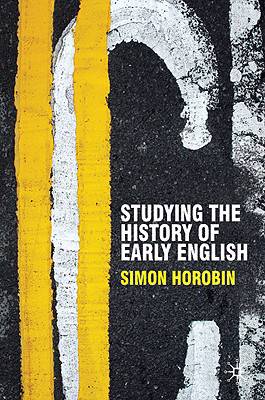
- Retrait gratuit dans votre magasin Club
- 7.000.000 titres dans notre catalogue
- Payer en toute sécurité
- Toujours un magasin près de chez vous
- Retrait gratuit dans votre magasin Club
- 7.000.0000 titres dans notre catalogue
- Payer en toute sécurité
- Toujours un magasin près de chez vous
Livres écrits par Simon Horobin
-
An Introduction to Middle English
George J Michell, Simon Horobin, Jeremy Smith
- Livre broché | Anglais
- This authoritative survey offers a concise description of Middle English, the language of Chaucer, during the period from 1100 to 1500. Middle English... Savoir plus
46,95 €Livraison 2 à 3 semaines46,95 €Livraison 2 à 3 semaines -
Studying the History of Early English
Simon Horobin
- Livre broché | Anglais | Perspectives on the English Language | n° 5
- This accessible book introduces students to the latest linguistic approaches and methodologies for studying the history of English. Horobin shows the ... Savoir plus
43,45 €Livraison 1 à 2 semaines43,45 €Livraison 1 à 2 semaines -
Pursuing Middle English Manuscripts and their Texts
Simon Horobin
- Livre relié | Anglais
- A collection of essays by leading scholars in the field of medieval manuscript studies. Savoir plus
90,10 €Livraison 1 à 4 semaines90,10 €Livraison 1 à 4 semaines -
Wardrobes and Rings
Julia Golding, Malcolm Guite, Simon Horobin
- Livre broché | Anglais
- Journey through Lent with the insight and imagination of the Oxford Inklings - a group of writers who reshaped Christian thought and storytelling in t... Savoir plus
18,45 €Pré-commander, disponible à partir du 30-11-202518,45 €Pré-commander, disponible à partir du 30-11-2025 -
The English Language
Simon Horobin
- Livre broché | Anglais | Very Short Introductions
- The English language is spoken by more than a billion people throughout the world. But where did English come from? And how has it evolved into the la... Savoir plus
13,95 €Livraison 1 à 2 semaines13,95 €Livraison 1 à 2 semaines -
Chaucer's Language
Simon Horobin
- Livre relié | Anglais
- The English language has changed dramatically over the past 500 years, making it increasingly difficult for students to read Chaucer's works. Assuming... Savoir plus
83,95 €Livraison 1 à 2 semaines83,95 €Livraison 1 à 2 semaines -
An Introduction to Middle English
Simon Horobin, Jeremy Smith
- Livre broché | Anglais | Edinburgh Textbooks on the English Language
- An Introduction to Middle English is designed to provide undergraduate students of English historical linguistics with a concise description of the la... Savoir plus
29,95 €Livraison 1 à 2 semaines29,95 €Livraison 1 à 2 semaines -
Bagels, Bumf, and Buses
Simon Horobin
- Livre relié | Anglais
- Where do our everyday words come from? The bagel you eat for breakfast, the bumf you have to wade through at the office, and the bus that takes you ho... Savoir plus
42,45 €Livraison 2 à 3 semaines42,45 €Livraison 2 à 3 semaines -
The Language of the Chaucer Tradition
Simon Horobin
- Livre relié | Anglais | Chaucer Studies | n° 32
- A study of the language of Chaucerian manuscripts, printed editions and Chaucer's 15th century followers. Winner of the 2005 Beatrice White Prize for ... Savoir plus
177,45 €Livraison 2 à 3 semaines177,45 €Livraison 2 à 3 semaines -
Studying the History of Early English
Simon Horobin
- Livre relié | Anglais | Perspectives on the English Language
- All living languages are subject to change, and in this highly accessible handbook, Simon Horobin shows the importance of thinking about why, as well ... Savoir plus
108,95 €Livraison 1 à 2 semaines108,95 €Livraison 1 à 2 semaines -
C. S. Lewis's Oxford
Simon Horobin
- Livre relié | Anglais
- A detailed portrait of C.S. Lewis and the influence Oxford had on his fantastical fiction, including newly discovered letters and an unpublished poem.... Savoir plus
43,45 €Livraison 1 à 2 semaines43,45 €Livraison 1 à 2 semaines -
Chaucer's Language
Simon Horobin
- Livre broché | Anglais
- The English language has changed dramatically over the past 500 years, making it increasingly difficult for students to read Chaucer's works. Assuming... Savoir plus
48,95 €Date de disponibilité inconnue48,95 €Date de disponibilité inconnue
12 sur 12 résultat(s) affiché(s)
















